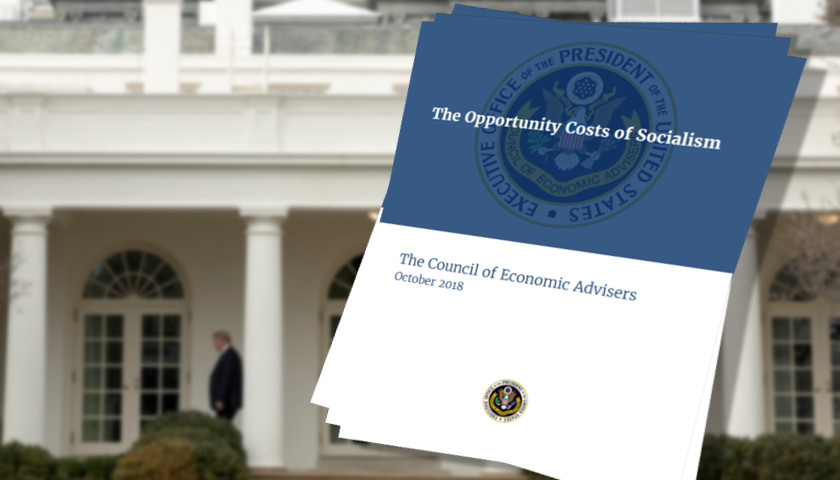by Joe Carter
On Tuesday the White House released “The Opportunity Costs of Socialism,” a report outlining the “opportunity costs of socialism on the macro economy, including standards of living, and the impact on the Federal budget.” The following is a summary and anaysis of its findings.
What is the purpose of the report?
The purpose of 70-page report (the main text is 55 pages while the list of references is 15 pages), which was produced by the Council of Economic Advisers, is to “evaluate the claims of modern U.S. socialists from the perspective of economists who have extensively studied the costs and benefits of socialism. We examine socialism’s historical and modern vision and intent, its economic incentives, its impact around the world on economic performance, and its relationship with recent policy proposals in the U.S.”
What is the Council of Economic Advisers?
The Council of Economic Advisers (CEA) is an agency within the Executive Office of the President that is charged with offering the President objective economic advice on the formulation of both domestic and international economic policy. Congress established the three-member council in the Employment Act of 1946. The portion of the bill that authorizes the CEA states the duty and function of the Council is:
• to assist and advise the President in the preparation of the Economic Report;
• to gather timely and authoritative information concerning economic developments and economic trends, both current and prospective, to analyze and interpret such information in the light of the policy declared in section 2 for the purpose of determining whether such developments and trends are interfering, or are likely to interfere, with the achievement of such policy, and to compile and submit to the President studies relating to such developments and trends;
• to appraise the various programs and activities of the Federal Government in the light of the policy declared in section 2 for the purpose of determining the extent to which such programs and activities are contributing, and the extent to which they are not contributing, to the achievement of such policy, and to make recommendations to the President with respect thereto;
• to develop and recommend to the President national economic policies to foster and promote free competitive enterprise, to avoid economic fluctuations or to diminish the effects thereof, and to maintain employment, production, and purchasing power;
• to make and furnish such studies, reports thereon, and recommendations with respect to matters of Federal economic policy and legislation as the President may request.
How does the report define socialism?
The report admits that it is unclear “exactly what a typical voter has in mind when he or she thinks of ‘socialism'” yet notes that “economists generally agree about how to define socialism, and they have devoted enormous time and resources to studying its costs and benefits.” The report also acknowledges that socialism is on a spectrum and countries are rarely either all-or-nothing on socialist policies.
According to the report, whether a country or industry is socialist is a question of the degree to which (a) the means of production, distribution, and exchange are owned or regulated by the state; and (b) the state uses its control to distribute the economic output without regard for final consumers’ willingness to pay or exchange (i.e., giving resources away ‘for free’).
What is an “opportunity cost”?
An opportunity cost is the benefit, profit, or value of something that must be given up to acquire or achieve something else. Opportunity costs are fundamental costs in economics, and are used in computing cost benefit analysis of a project or policy.
If socialism is a spectrum, what is the benchmark standard for the “opportunity costs” listed in the report?
For the basis of its empirical claims, the report takes current U.S. public policies as the benchmark standard. “This benchmark has the advantage of being measurable,” notes the report, “but it necessarily differs from theoretical concepts of ‘capitalism’ or ‘free markets’ because the U.S. government may not limit its activity to theoretically defined public goods.”
“Relative to the U.S. benchmark,” adds the report, “we find that socialist public policies, though ostensibly well-intentioned, have clear opportunity costs that are directly related to the degree to which they tax and regulate.”
What is in the report?
Below are highlights and quotes that provide an overview and summary of the contents of the report:
• In the twentieth century, socialists accused the agriculture sector of being unfair and unproductive. Today, socialists argue that healthcare, education, and other sectors are unfair and unproductive, and they promise that large state organizations will deliver fairness and economies of scale.
• Present-day socialists do not want the “dictatorship or state brutality” that often coincided with the “most extreme cases of socialism.” But implementing such policies will still cause the same problems as previous socialist states (i.e., high tax rates, large state organizations, and the centralized control of resources).
• Socialist policies tend to make countries poorer. Replacing U.S. policies with highly socialist policies such as Venezuela’s would reduce real GDP more than 40 percent in the long run, or about $24,000 per year for the average person.
• Nordic countries aren’t the socialist success stories they are often touted as being, and in many ways are no longer even socialistic. For example, Nordic healthcare is not free but rather requires substantial cost sharing. Also, Nordic countries tax capital income less and regulate product markets less than the United States does. Still, because of their existing socialist policies, living standards in the Nordic countries are at least 15 percent lower than in the U.S.
• Historical and contemporary socialists argue—despite the empirical and historical evidence—that heavy taxation need not reduce national output because a public enterprise uses its efficiency and bargaining power to achieve better outcomes.
• Socialists in America are less concerned with state ownership of the means of production as with state control of the means of production.
• A primary challenge for socialism is that the persons deciding on resource allocations—that is, how much to spend on a product and how that product should be manufactured and delivered to the final consumer—are different from those providing the resources and different from the final consumer who is ultimately using them. Most socialist policy options ignore the distinction between spending your money on yourself and spending someone else’s money on someone else.
• “An important reason that people work and put forth effort is to obtain goods and services that they want. Under socialism, the things they want may be unavailable because the market no longer exists, or are made available without the need for working.”
• “Although socialist policies are ostensibly implemented to reduce poverty and inequality, it was the end of highly socialist policies in China that brought these results on a worldwide scale.”
• Democrats in the Senate and House support “Medicare for All” (M4A) plans which make it unlawful for a private business to sell health insurance, or for a private employer to offer health insurance to its employees. “The quality or productivity of the monopoly plan would be determined through centrally planned rules and regulations. As opposed to a market with competition, if a patient did not like the tax charged or the quality of the care provided by the government monopoly, he or she would have no recourse.”
• “If financed solely through higher taxes, we find that the program would reduce long-run GDP by 9 percent and household incomes after taxes and health expenditures by 19 percent. Evidence on the productivity and effectiveness of single-payer systems suggests that M4A would reduce longevity and health, particularly among the elderly, while only minimally increasing the fraction of the population with health insurance.”
• “The historical evidence suggests that the socialist program for the U.S. would make shortages, or otherwise degrade quality, of whatever product or service is put under a public monopoly. The pace of innovation would slow, and living standards generally would be lower. These are the opportunity costs of socialism from a modern American perspective.”
Read the full report:
[pdf-embedder url=”http://theohiostar.com/wp-content/uploads/2018/11/White-House-report-The-Opportunity-Costs-of-Socialism.pdf”]
– – –
Joe Carter is a Senior Editor at the Acton Institute. Joe also serves as an editor at the The Gospel Coalition, a communications specialist for the Ethics and Religious Liberty Commission of the Southern Baptist Convention, and as an adjunct professor of journalism at Patrick Henry College. He is the editor of the NIV Lifehacks Bible and co-author of How to Argue like Jesus: Learning Persuasion from History’s Greatest Communicator (Crossway).





